Physical Activity's Impact on Dementia and Cognitive Decline
VerifiedAdded on 2020/01/21
|14
|4082
|93
Report
AI Summary
This report investigates the effects of physical activity on dementia, Alzheimer's disease, and cognitive decline, drawing from three research articles and meta-analyses. The introduction highlights the increasing prevalence of age-related diseases and the potential benefits of physical activity in mitigating the negative impacts of dementia. The report employs the PICO framework to define the clinical question and outlines the search strategy used, including databases like The Cochrane Library and BioMed Central. Each article is summarized, critically appraised, and evaluated for its strengths, limitations, relevance, and impact on the chosen topic. The report explores the various research terms used, such as dementia and physical activity, and provides an evidence-based conclusion regarding the positive effects of physical activity on cognitive function and overall well-being of individuals with dementia. The report also discusses the importance of different physical activities, the study's limitations, and its relevance to improving the health conditions of patients with dementia.
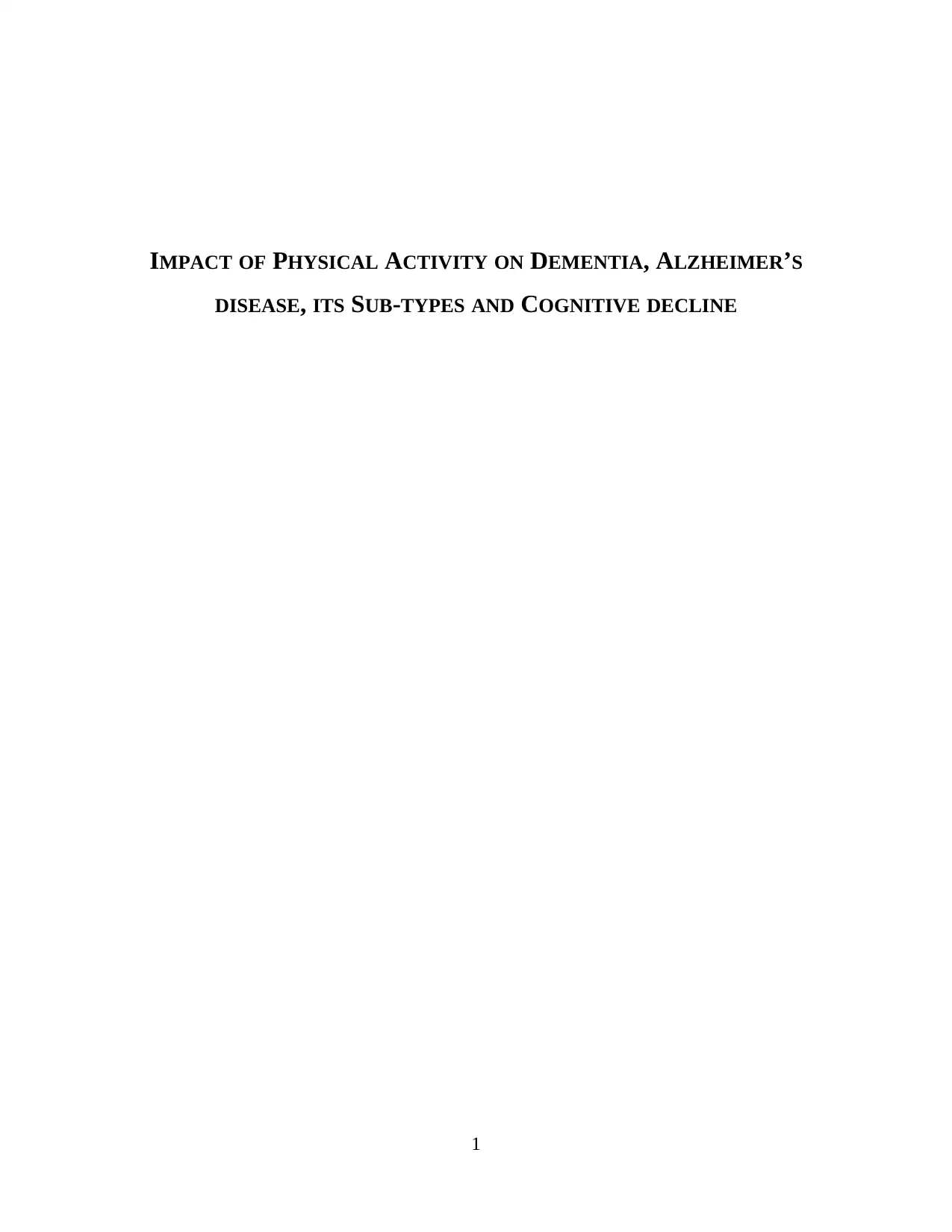
IMPACT OF PHYSICAL ACTIVITY ON DEMENTIA, ALZHEIMER’S
DISEASE, ITS SUB-TYPES AND COGNITIVE DECLINE
1
DISEASE, ITS SUB-TYPES AND COGNITIVE DECLINE
1
Paraphrase This Document
Need a fresh take? Get an instant paraphrase of this document with our AI Paraphraser
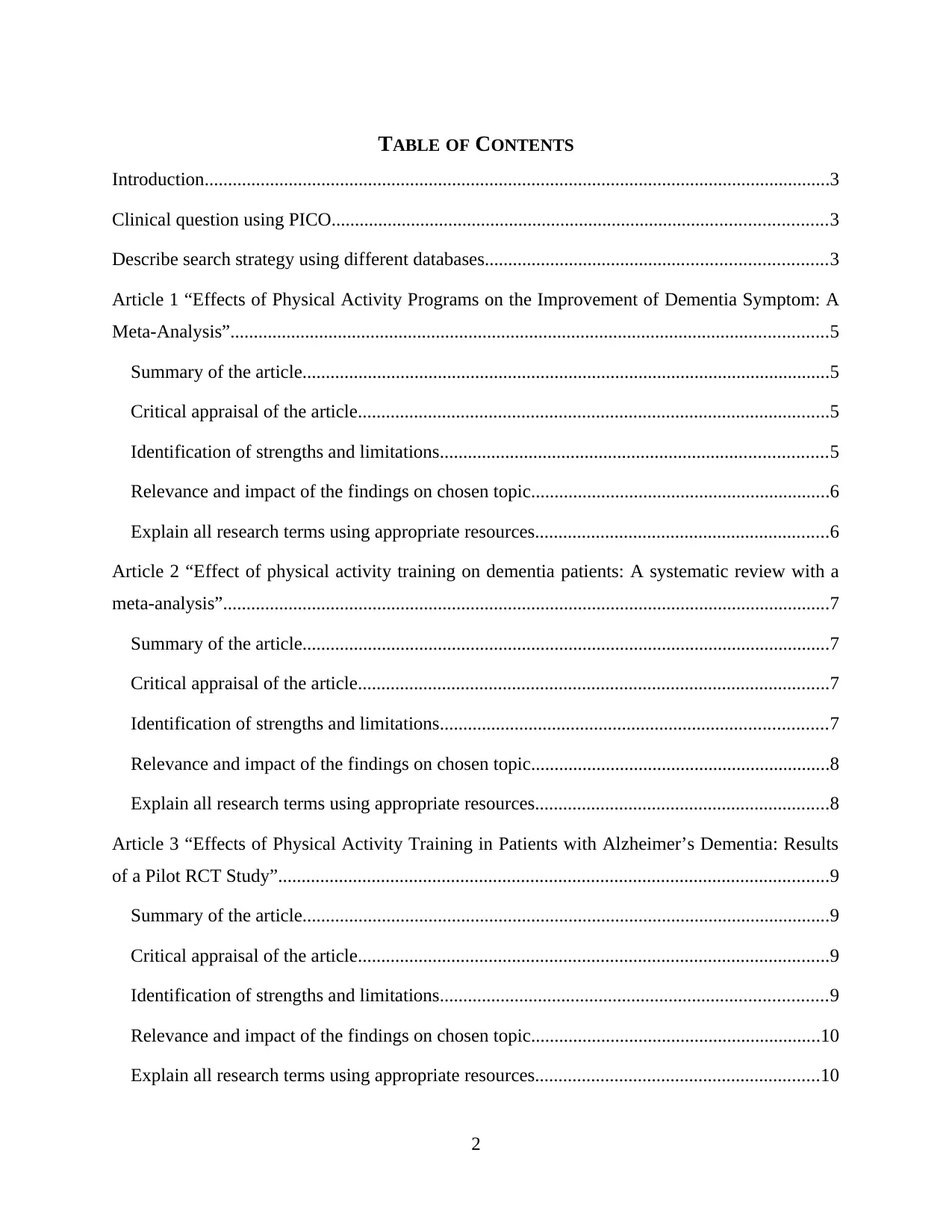
TABLE OF CONTENTS
Introduction......................................................................................................................................3
Clinical question using PICO..........................................................................................................3
Describe search strategy using different databases.........................................................................3
Article 1 “Effects of Physical Activity Programs on the Improvement of Dementia Symptom: A
Meta-Analysis”................................................................................................................................5
Summary of the article.................................................................................................................5
Critical appraisal of the article.....................................................................................................5
Identification of strengths and limitations...................................................................................5
Relevance and impact of the findings on chosen topic................................................................6
Explain all research terms using appropriate resources...............................................................6
Article 2 “Effect of physical activity training on dementia patients: A systematic review with a
meta-analysis”..................................................................................................................................7
Summary of the article.................................................................................................................7
Critical appraisal of the article.....................................................................................................7
Identification of strengths and limitations...................................................................................7
Relevance and impact of the findings on chosen topic................................................................8
Explain all research terms using appropriate resources...............................................................8
Article 3 “Effects of Physical Activity Training in Patients with Alzheimer’s Dementia: Results
of a Pilot RCT Study”......................................................................................................................9
Summary of the article.................................................................................................................9
Critical appraisal of the article.....................................................................................................9
Identification of strengths and limitations...................................................................................9
Relevance and impact of the findings on chosen topic..............................................................10
Explain all research terms using appropriate resources.............................................................10
2
Introduction......................................................................................................................................3
Clinical question using PICO..........................................................................................................3
Describe search strategy using different databases.........................................................................3
Article 1 “Effects of Physical Activity Programs on the Improvement of Dementia Symptom: A
Meta-Analysis”................................................................................................................................5
Summary of the article.................................................................................................................5
Critical appraisal of the article.....................................................................................................5
Identification of strengths and limitations...................................................................................5
Relevance and impact of the findings on chosen topic................................................................6
Explain all research terms using appropriate resources...............................................................6
Article 2 “Effect of physical activity training on dementia patients: A systematic review with a
meta-analysis”..................................................................................................................................7
Summary of the article.................................................................................................................7
Critical appraisal of the article.....................................................................................................7
Identification of strengths and limitations...................................................................................7
Relevance and impact of the findings on chosen topic................................................................8
Explain all research terms using appropriate resources...............................................................8
Article 3 “Effects of Physical Activity Training in Patients with Alzheimer’s Dementia: Results
of a Pilot RCT Study”......................................................................................................................9
Summary of the article.................................................................................................................9
Critical appraisal of the article.....................................................................................................9
Identification of strengths and limitations...................................................................................9
Relevance and impact of the findings on chosen topic..............................................................10
Explain all research terms using appropriate resources.............................................................10
2

Evidence- based conclusion...........................................................................................................10
References......................................................................................................................................12
3
References......................................................................................................................................12
3
⊘ This is a preview!⊘
Do you want full access?
Subscribe today to unlock all pages.

Trusted by 1+ million students worldwide
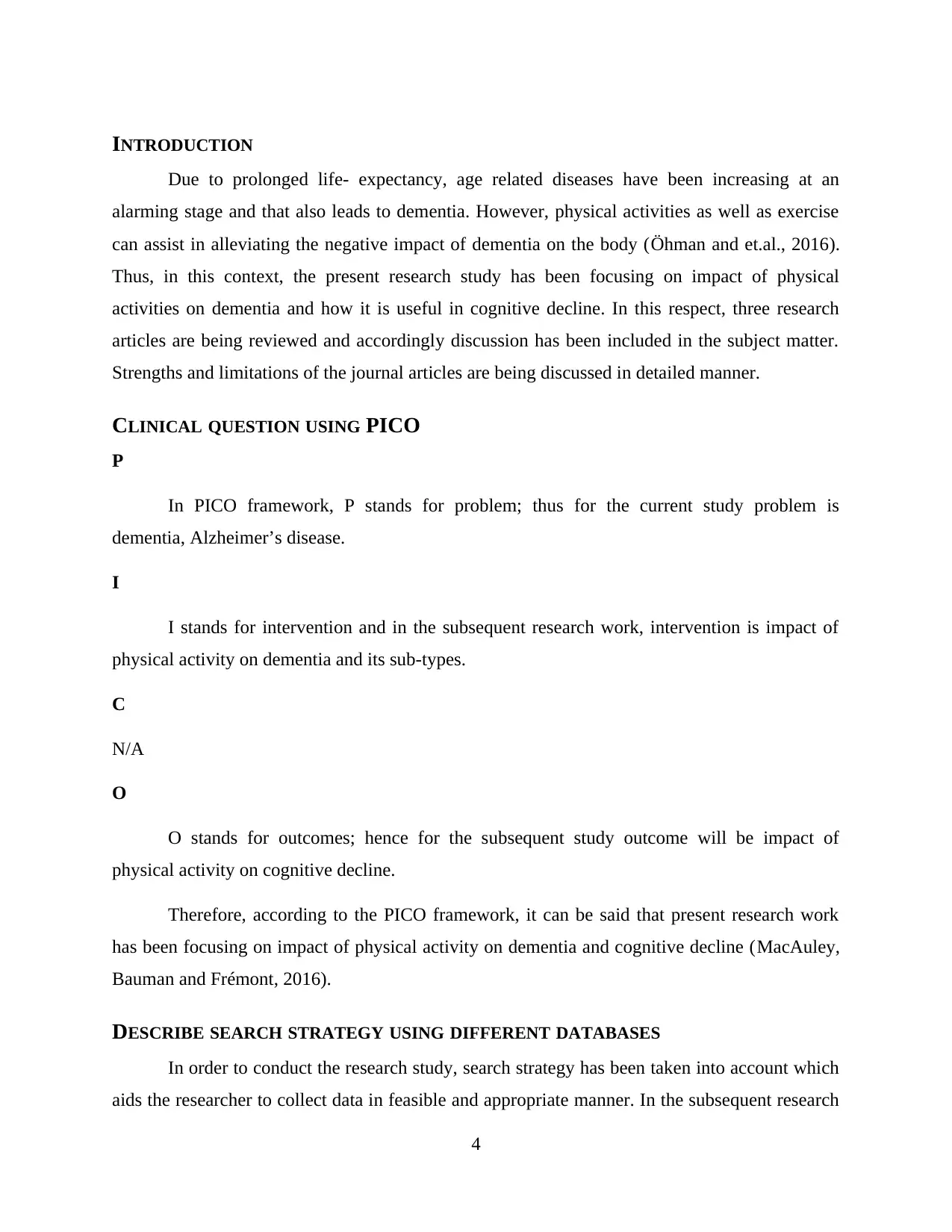
INTRODUCTION
Due to prolonged life- expectancy, age related diseases have been increasing at an
alarming stage and that also leads to dementia. However, physical activities as well as exercise
can assist in alleviating the negative impact of dementia on the body (Öhman and et.al., 2016).
Thus, in this context, the present research study has been focusing on impact of physical
activities on dementia and how it is useful in cognitive decline. In this respect, three research
articles are being reviewed and accordingly discussion has been included in the subject matter.
Strengths and limitations of the journal articles are being discussed in detailed manner.
CLINICAL QUESTION USING PICO
P
In PICO framework, P stands for problem; thus for the current study problem is
dementia, Alzheimer’s disease.
I
I stands for intervention and in the subsequent research work, intervention is impact of
physical activity on dementia and its sub-types.
C
N/A
O
O stands for outcomes; hence for the subsequent study outcome will be impact of
physical activity on cognitive decline.
Therefore, according to the PICO framework, it can be said that present research work
has been focusing on impact of physical activity on dementia and cognitive decline (MacAuley,
Bauman and Frémont, 2016).
DESCRIBE SEARCH STRATEGY USING DIFFERENT DATABASES
In order to conduct the research study, search strategy has been taken into account which
aids the researcher to collect data in feasible and appropriate manner. In the subsequent research
4
Due to prolonged life- expectancy, age related diseases have been increasing at an
alarming stage and that also leads to dementia. However, physical activities as well as exercise
can assist in alleviating the negative impact of dementia on the body (Öhman and et.al., 2016).
Thus, in this context, the present research study has been focusing on impact of physical
activities on dementia and how it is useful in cognitive decline. In this respect, three research
articles are being reviewed and accordingly discussion has been included in the subject matter.
Strengths and limitations of the journal articles are being discussed in detailed manner.
CLINICAL QUESTION USING PICO
P
In PICO framework, P stands for problem; thus for the current study problem is
dementia, Alzheimer’s disease.
I
I stands for intervention and in the subsequent research work, intervention is impact of
physical activity on dementia and its sub-types.
C
N/A
O
O stands for outcomes; hence for the subsequent study outcome will be impact of
physical activity on cognitive decline.
Therefore, according to the PICO framework, it can be said that present research work
has been focusing on impact of physical activity on dementia and cognitive decline (MacAuley,
Bauman and Frémont, 2016).
DESCRIBE SEARCH STRATEGY USING DIFFERENT DATABASES
In order to conduct the research study, search strategy has been taken into account which
aids the researcher to collect data in feasible and appropriate manner. In the subsequent research
4
Paraphrase This Document
Need a fresh take? Get an instant paraphrase of this document with our AI Paraphraser
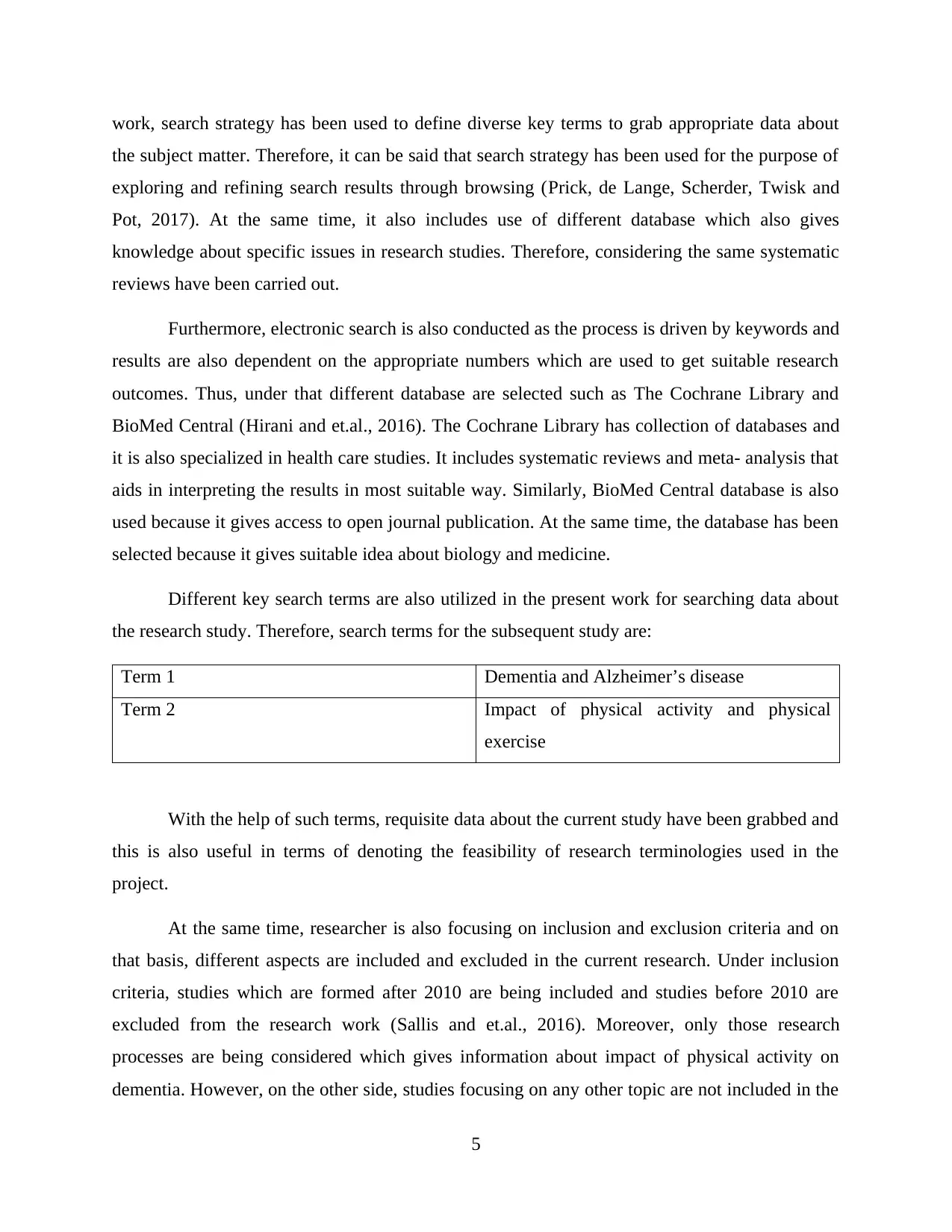
work, search strategy has been used to define diverse key terms to grab appropriate data about
the subject matter. Therefore, it can be said that search strategy has been used for the purpose of
exploring and refining search results through browsing (Prick, de Lange, Scherder, Twisk and
Pot, 2017). At the same time, it also includes use of different database which also gives
knowledge about specific issues in research studies. Therefore, considering the same systematic
reviews have been carried out.
Furthermore, electronic search is also conducted as the process is driven by keywords and
results are also dependent on the appropriate numbers which are used to get suitable research
outcomes. Thus, under that different database are selected such as The Cochrane Library and
BioMed Central (Hirani and et.al., 2016). The Cochrane Library has collection of databases and
it is also specialized in health care studies. It includes systematic reviews and meta- analysis that
aids in interpreting the results in most suitable way. Similarly, BioMed Central database is also
used because it gives access to open journal publication. At the same time, the database has been
selected because it gives suitable idea about biology and medicine.
Different key search terms are also utilized in the present work for searching data about
the research study. Therefore, search terms for the subsequent study are:
Term 1 Dementia and Alzheimer’s disease
Term 2 Impact of physical activity and physical
exercise
With the help of such terms, requisite data about the current study have been grabbed and
this is also useful in terms of denoting the feasibility of research terminologies used in the
project.
At the same time, researcher is also focusing on inclusion and exclusion criteria and on
that basis, different aspects are included and excluded in the current research. Under inclusion
criteria, studies which are formed after 2010 are being included and studies before 2010 are
excluded from the research work (Sallis and et.al., 2016). Moreover, only those research
processes are being considered which gives information about impact of physical activity on
dementia. However, on the other side, studies focusing on any other topic are not included in the
5
the subject matter. Therefore, it can be said that search strategy has been used for the purpose of
exploring and refining search results through browsing (Prick, de Lange, Scherder, Twisk and
Pot, 2017). At the same time, it also includes use of different database which also gives
knowledge about specific issues in research studies. Therefore, considering the same systematic
reviews have been carried out.
Furthermore, electronic search is also conducted as the process is driven by keywords and
results are also dependent on the appropriate numbers which are used to get suitable research
outcomes. Thus, under that different database are selected such as The Cochrane Library and
BioMed Central (Hirani and et.al., 2016). The Cochrane Library has collection of databases and
it is also specialized in health care studies. It includes systematic reviews and meta- analysis that
aids in interpreting the results in most suitable way. Similarly, BioMed Central database is also
used because it gives access to open journal publication. At the same time, the database has been
selected because it gives suitable idea about biology and medicine.
Different key search terms are also utilized in the present work for searching data about
the research study. Therefore, search terms for the subsequent study are:
Term 1 Dementia and Alzheimer’s disease
Term 2 Impact of physical activity and physical
exercise
With the help of such terms, requisite data about the current study have been grabbed and
this is also useful in terms of denoting the feasibility of research terminologies used in the
project.
At the same time, researcher is also focusing on inclusion and exclusion criteria and on
that basis, different aspects are included and excluded in the current research. Under inclusion
criteria, studies which are formed after 2010 are being included and studies before 2010 are
excluded from the research work (Sallis and et.al., 2016). Moreover, only those research
processes are being considered which gives information about impact of physical activity on
dementia. However, on the other side, studies focusing on any other topic are not included in the
5
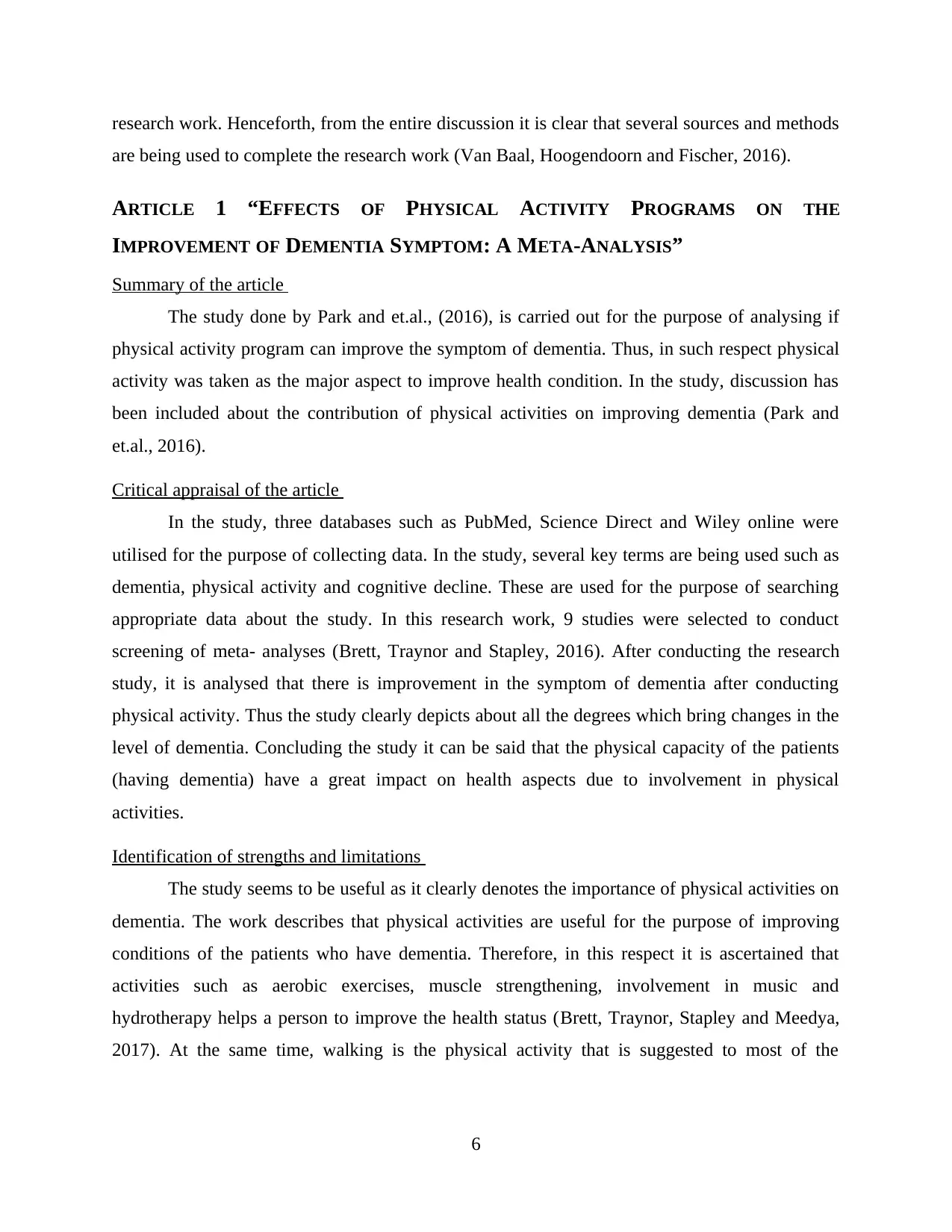
research work. Henceforth, from the entire discussion it is clear that several sources and methods
are being used to complete the research work (Van Baal, Hoogendoorn and Fischer, 2016).
ARTICLE 1 “EFFECTS OF PHYSICAL ACTIVITY PROGRAMS ON THE
IMPROVEMENT OF DEMENTIA SYMPTOM: A META-ANALYSIS”
Summary of the article
The study done by Park and et.al., (2016), is carried out for the purpose of analysing if
physical activity program can improve the symptom of dementia. Thus, in such respect physical
activity was taken as the major aspect to improve health condition. In the study, discussion has
been included about the contribution of physical activities on improving dementia (Park and
et.al., 2016).
Critical appraisal of the article
In the study, three databases such as PubMed, Science Direct and Wiley online were
utilised for the purpose of collecting data. In the study, several key terms are being used such as
dementia, physical activity and cognitive decline. These are used for the purpose of searching
appropriate data about the study. In this research work, 9 studies were selected to conduct
screening of meta- analyses (Brett, Traynor and Stapley, 2016). After conducting the research
study, it is analysed that there is improvement in the symptom of dementia after conducting
physical activity. Thus the study clearly depicts about all the degrees which bring changes in the
level of dementia. Concluding the study it can be said that the physical capacity of the patients
(having dementia) have a great impact on health aspects due to involvement in physical
activities.
Identification of strengths and limitations
The study seems to be useful as it clearly denotes the importance of physical activities on
dementia. The work describes that physical activities are useful for the purpose of improving
conditions of the patients who have dementia. Therefore, in this respect it is ascertained that
activities such as aerobic exercises, muscle strengthening, involvement in music and
hydrotherapy helps a person to improve the health status (Brett, Traynor, Stapley and Meedya,
2017). At the same time, walking is the physical activity that is suggested to most of the
6
are being used to complete the research work (Van Baal, Hoogendoorn and Fischer, 2016).
ARTICLE 1 “EFFECTS OF PHYSICAL ACTIVITY PROGRAMS ON THE
IMPROVEMENT OF DEMENTIA SYMPTOM: A META-ANALYSIS”
Summary of the article
The study done by Park and et.al., (2016), is carried out for the purpose of analysing if
physical activity program can improve the symptom of dementia. Thus, in such respect physical
activity was taken as the major aspect to improve health condition. In the study, discussion has
been included about the contribution of physical activities on improving dementia (Park and
et.al., 2016).
Critical appraisal of the article
In the study, three databases such as PubMed, Science Direct and Wiley online were
utilised for the purpose of collecting data. In the study, several key terms are being used such as
dementia, physical activity and cognitive decline. These are used for the purpose of searching
appropriate data about the study. In this research work, 9 studies were selected to conduct
screening of meta- analyses (Brett, Traynor and Stapley, 2016). After conducting the research
study, it is analysed that there is improvement in the symptom of dementia after conducting
physical activity. Thus the study clearly depicts about all the degrees which bring changes in the
level of dementia. Concluding the study it can be said that the physical capacity of the patients
(having dementia) have a great impact on health aspects due to involvement in physical
activities.
Identification of strengths and limitations
The study seems to be useful as it clearly denotes the importance of physical activities on
dementia. The work describes that physical activities are useful for the purpose of improving
conditions of the patients who have dementia. Therefore, in this respect it is ascertained that
activities such as aerobic exercises, muscle strengthening, involvement in music and
hydrotherapy helps a person to improve the health status (Brett, Traynor, Stapley and Meedya,
2017). At the same time, walking is the physical activity that is suggested to most of the
6
⊘ This is a preview!⊘
Do you want full access?
Subscribe today to unlock all pages.

Trusted by 1+ million students worldwide
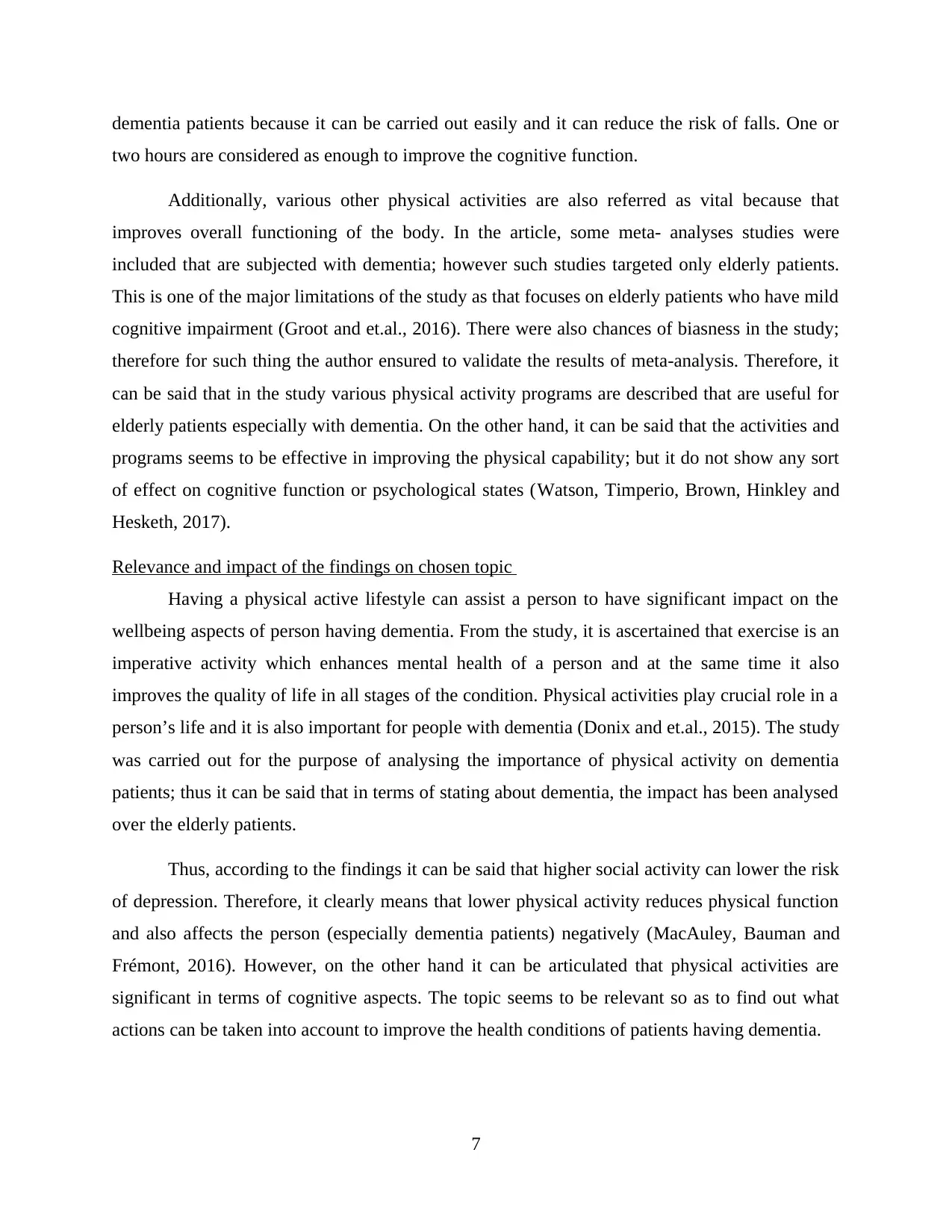
dementia patients because it can be carried out easily and it can reduce the risk of falls. One or
two hours are considered as enough to improve the cognitive function.
Additionally, various other physical activities are also referred as vital because that
improves overall functioning of the body. In the article, some meta- analyses studies were
included that are subjected with dementia; however such studies targeted only elderly patients.
This is one of the major limitations of the study as that focuses on elderly patients who have mild
cognitive impairment (Groot and et.al., 2016). There were also chances of biasness in the study;
therefore for such thing the author ensured to validate the results of meta-analysis. Therefore, it
can be said that in the study various physical activity programs are described that are useful for
elderly patients especially with dementia. On the other hand, it can be said that the activities and
programs seems to be effective in improving the physical capability; but it do not show any sort
of effect on cognitive function or psychological states (Watson, Timperio, Brown, Hinkley and
Hesketh, 2017).
Relevance and impact of the findings on chosen topic
Having a physical active lifestyle can assist a person to have significant impact on the
wellbeing aspects of person having dementia. From the study, it is ascertained that exercise is an
imperative activity which enhances mental health of a person and at the same time it also
improves the quality of life in all stages of the condition. Physical activities play crucial role in a
person’s life and it is also important for people with dementia (Donix and et.al., 2015). The study
was carried out for the purpose of analysing the importance of physical activity on dementia
patients; thus it can be said that in terms of stating about dementia, the impact has been analysed
over the elderly patients.
Thus, according to the findings it can be said that higher social activity can lower the risk
of depression. Therefore, it clearly means that lower physical activity reduces physical function
and also affects the person (especially dementia patients) negatively (MacAuley, Bauman and
Frémont, 2016). However, on the other hand it can be articulated that physical activities are
significant in terms of cognitive aspects. The topic seems to be relevant so as to find out what
actions can be taken into account to improve the health conditions of patients having dementia.
7
two hours are considered as enough to improve the cognitive function.
Additionally, various other physical activities are also referred as vital because that
improves overall functioning of the body. In the article, some meta- analyses studies were
included that are subjected with dementia; however such studies targeted only elderly patients.
This is one of the major limitations of the study as that focuses on elderly patients who have mild
cognitive impairment (Groot and et.al., 2016). There were also chances of biasness in the study;
therefore for such thing the author ensured to validate the results of meta-analysis. Therefore, it
can be said that in the study various physical activity programs are described that are useful for
elderly patients especially with dementia. On the other hand, it can be said that the activities and
programs seems to be effective in improving the physical capability; but it do not show any sort
of effect on cognitive function or psychological states (Watson, Timperio, Brown, Hinkley and
Hesketh, 2017).
Relevance and impact of the findings on chosen topic
Having a physical active lifestyle can assist a person to have significant impact on the
wellbeing aspects of person having dementia. From the study, it is ascertained that exercise is an
imperative activity which enhances mental health of a person and at the same time it also
improves the quality of life in all stages of the condition. Physical activities play crucial role in a
person’s life and it is also important for people with dementia (Donix and et.al., 2015). The study
was carried out for the purpose of analysing the importance of physical activity on dementia
patients; thus it can be said that in terms of stating about dementia, the impact has been analysed
over the elderly patients.
Thus, according to the findings it can be said that higher social activity can lower the risk
of depression. Therefore, it clearly means that lower physical activity reduces physical function
and also affects the person (especially dementia patients) negatively (MacAuley, Bauman and
Frémont, 2016). However, on the other hand it can be articulated that physical activities are
significant in terms of cognitive aspects. The topic seems to be relevant so as to find out what
actions can be taken into account to improve the health conditions of patients having dementia.
7
Paraphrase This Document
Need a fresh take? Get an instant paraphrase of this document with our AI Paraphraser
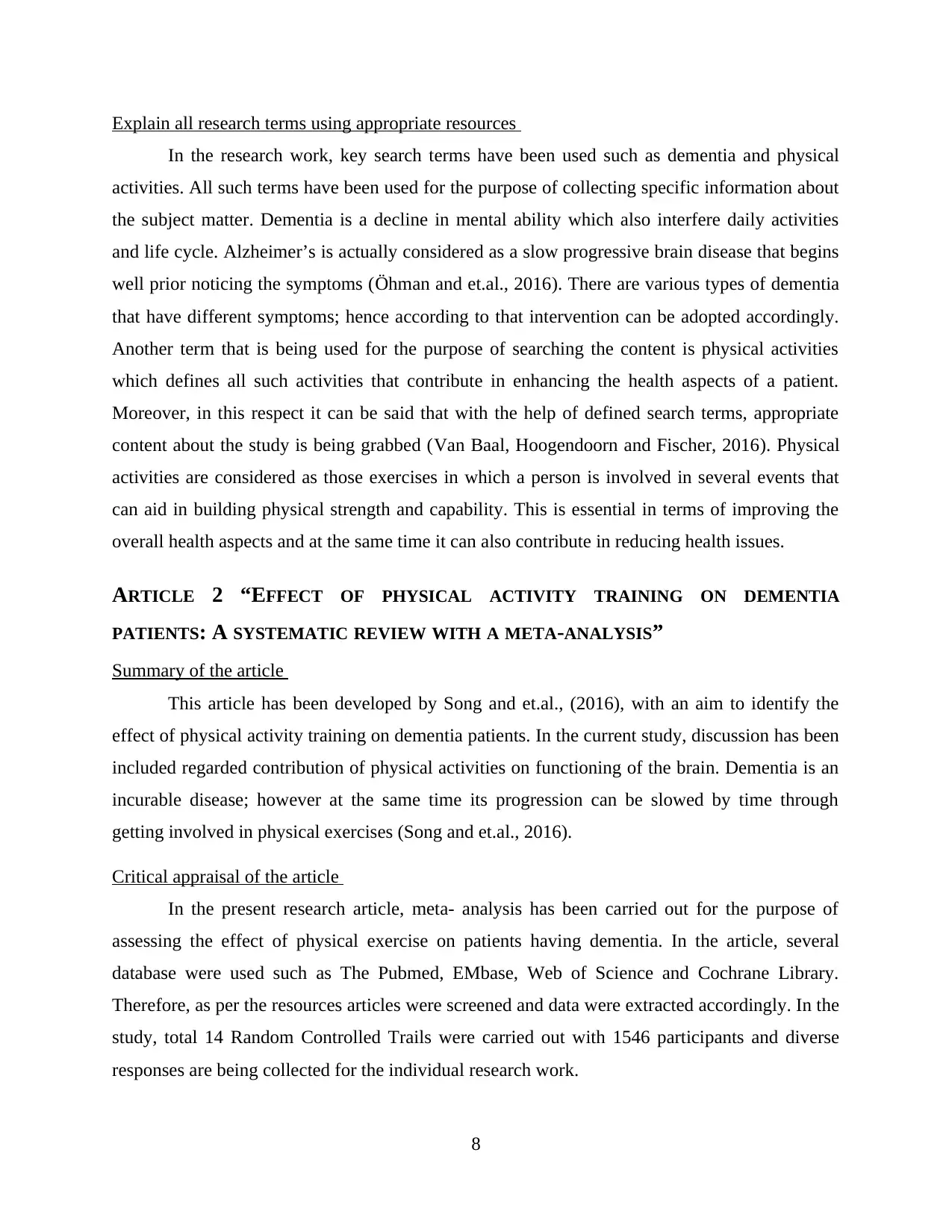
Explain all research terms using appropriate resources
In the research work, key search terms have been used such as dementia and physical
activities. All such terms have been used for the purpose of collecting specific information about
the subject matter. Dementia is a decline in mental ability which also interfere daily activities
and life cycle. Alzheimer’s is actually considered as a slow progressive brain disease that begins
well prior noticing the symptoms (Öhman and et.al., 2016). There are various types of dementia
that have different symptoms; hence according to that intervention can be adopted accordingly.
Another term that is being used for the purpose of searching the content is physical activities
which defines all such activities that contribute in enhancing the health aspects of a patient.
Moreover, in this respect it can be said that with the help of defined search terms, appropriate
content about the study is being grabbed (Van Baal, Hoogendoorn and Fischer, 2016). Physical
activities are considered as those exercises in which a person is involved in several events that
can aid in building physical strength and capability. This is essential in terms of improving the
overall health aspects and at the same time it can also contribute in reducing health issues.
ARTICLE 2 “EFFECT OF PHYSICAL ACTIVITY TRAINING ON DEMENTIA
PATIENTS: A SYSTEMATIC REVIEW WITH A META-ANALYSIS”
Summary of the article
This article has been developed by Song and et.al., (2016), with an aim to identify the
effect of physical activity training on dementia patients. In the current study, discussion has been
included regarded contribution of physical activities on functioning of the brain. Dementia is an
incurable disease; however at the same time its progression can be slowed by time through
getting involved in physical exercises (Song and et.al., 2016).
Critical appraisal of the article
In the present research article, meta- analysis has been carried out for the purpose of
assessing the effect of physical exercise on patients having dementia. In the article, several
database were used such as The Pubmed, EMbase, Web of Science and Cochrane Library.
Therefore, as per the resources articles were screened and data were extracted accordingly. In the
study, total 14 Random Controlled Trails were carried out with 1546 participants and diverse
responses are being collected for the individual research work.
8
In the research work, key search terms have been used such as dementia and physical
activities. All such terms have been used for the purpose of collecting specific information about
the subject matter. Dementia is a decline in mental ability which also interfere daily activities
and life cycle. Alzheimer’s is actually considered as a slow progressive brain disease that begins
well prior noticing the symptoms (Öhman and et.al., 2016). There are various types of dementia
that have different symptoms; hence according to that intervention can be adopted accordingly.
Another term that is being used for the purpose of searching the content is physical activities
which defines all such activities that contribute in enhancing the health aspects of a patient.
Moreover, in this respect it can be said that with the help of defined search terms, appropriate
content about the study is being grabbed (Van Baal, Hoogendoorn and Fischer, 2016). Physical
activities are considered as those exercises in which a person is involved in several events that
can aid in building physical strength and capability. This is essential in terms of improving the
overall health aspects and at the same time it can also contribute in reducing health issues.
ARTICLE 2 “EFFECT OF PHYSICAL ACTIVITY TRAINING ON DEMENTIA
PATIENTS: A SYSTEMATIC REVIEW WITH A META-ANALYSIS”
Summary of the article
This article has been developed by Song and et.al., (2016), with an aim to identify the
effect of physical activity training on dementia patients. In the current study, discussion has been
included regarded contribution of physical activities on functioning of the brain. Dementia is an
incurable disease; however at the same time its progression can be slowed by time through
getting involved in physical exercises (Song and et.al., 2016).
Critical appraisal of the article
In the present research article, meta- analysis has been carried out for the purpose of
assessing the effect of physical exercise on patients having dementia. In the article, several
database were used such as The Pubmed, EMbase, Web of Science and Cochrane Library.
Therefore, as per the resources articles were screened and data were extracted accordingly. In the
study, total 14 Random Controlled Trails were carried out with 1546 participants and diverse
responses are being collected for the individual research work.
8
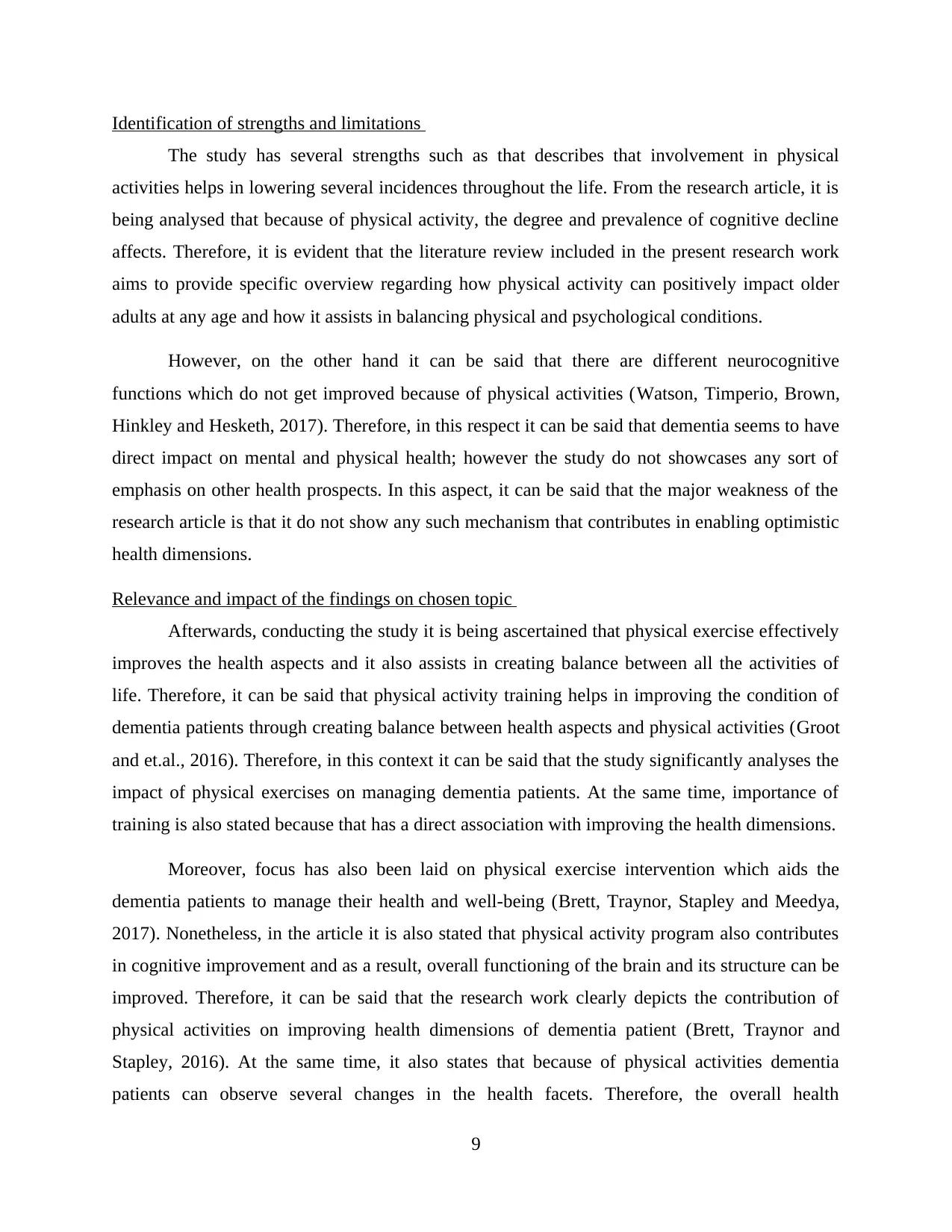
Identification of strengths and limitations
The study has several strengths such as that describes that involvement in physical
activities helps in lowering several incidences throughout the life. From the research article, it is
being analysed that because of physical activity, the degree and prevalence of cognitive decline
affects. Therefore, it is evident that the literature review included in the present research work
aims to provide specific overview regarding how physical activity can positively impact older
adults at any age and how it assists in balancing physical and psychological conditions.
However, on the other hand it can be said that there are different neurocognitive
functions which do not get improved because of physical activities (Watson, Timperio, Brown,
Hinkley and Hesketh, 2017). Therefore, in this respect it can be said that dementia seems to have
direct impact on mental and physical health; however the study do not showcases any sort of
emphasis on other health prospects. In this aspect, it can be said that the major weakness of the
research article is that it do not show any such mechanism that contributes in enabling optimistic
health dimensions.
Relevance and impact of the findings on chosen topic
Afterwards, conducting the study it is being ascertained that physical exercise effectively
improves the health aspects and it also assists in creating balance between all the activities of
life. Therefore, it can be said that physical activity training helps in improving the condition of
dementia patients through creating balance between health aspects and physical activities (Groot
and et.al., 2016). Therefore, in this context it can be said that the study significantly analyses the
impact of physical exercises on managing dementia patients. At the same time, importance of
training is also stated because that has a direct association with improving the health dimensions.
Moreover, focus has also been laid on physical exercise intervention which aids the
dementia patients to manage their health and well-being (Brett, Traynor, Stapley and Meedya,
2017). Nonetheless, in the article it is also stated that physical activity program also contributes
in cognitive improvement and as a result, overall functioning of the brain and its structure can be
improved. Therefore, it can be said that the research work clearly depicts the contribution of
physical activities on improving health dimensions of dementia patient (Brett, Traynor and
Stapley, 2016). At the same time, it also states that because of physical activities dementia
patients can observe several changes in the health facets. Therefore, the overall health
9
The study has several strengths such as that describes that involvement in physical
activities helps in lowering several incidences throughout the life. From the research article, it is
being analysed that because of physical activity, the degree and prevalence of cognitive decline
affects. Therefore, it is evident that the literature review included in the present research work
aims to provide specific overview regarding how physical activity can positively impact older
adults at any age and how it assists in balancing physical and psychological conditions.
However, on the other hand it can be said that there are different neurocognitive
functions which do not get improved because of physical activities (Watson, Timperio, Brown,
Hinkley and Hesketh, 2017). Therefore, in this respect it can be said that dementia seems to have
direct impact on mental and physical health; however the study do not showcases any sort of
emphasis on other health prospects. In this aspect, it can be said that the major weakness of the
research article is that it do not show any such mechanism that contributes in enabling optimistic
health dimensions.
Relevance and impact of the findings on chosen topic
Afterwards, conducting the study it is being ascertained that physical exercise effectively
improves the health aspects and it also assists in creating balance between all the activities of
life. Therefore, it can be said that physical activity training helps in improving the condition of
dementia patients through creating balance between health aspects and physical activities (Groot
and et.al., 2016). Therefore, in this context it can be said that the study significantly analyses the
impact of physical exercises on managing dementia patients. At the same time, importance of
training is also stated because that has a direct association with improving the health dimensions.
Moreover, focus has also been laid on physical exercise intervention which aids the
dementia patients to manage their health and well-being (Brett, Traynor, Stapley and Meedya,
2017). Nonetheless, in the article it is also stated that physical activity program also contributes
in cognitive improvement and as a result, overall functioning of the brain and its structure can be
improved. Therefore, it can be said that the research work clearly depicts the contribution of
physical activities on improving health dimensions of dementia patient (Brett, Traynor and
Stapley, 2016). At the same time, it also states that because of physical activities dementia
patients can observe several changes in the health facets. Therefore, the overall health
9
⊘ This is a preview!⊘
Do you want full access?
Subscribe today to unlock all pages.

Trusted by 1+ million students worldwide
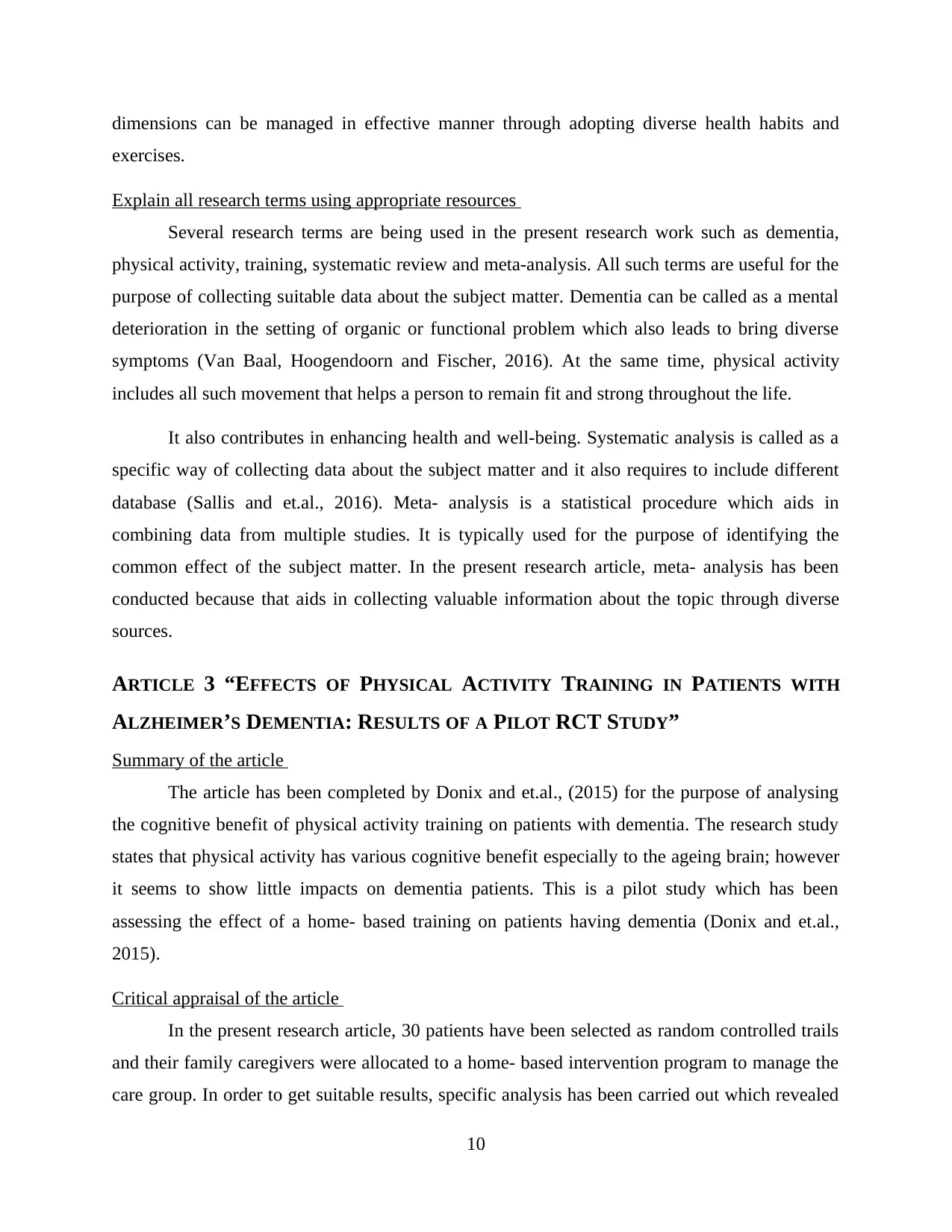
dimensions can be managed in effective manner through adopting diverse health habits and
exercises.
Explain all research terms using appropriate resources
Several research terms are being used in the present research work such as dementia,
physical activity, training, systematic review and meta-analysis. All such terms are useful for the
purpose of collecting suitable data about the subject matter. Dementia can be called as a mental
deterioration in the setting of organic or functional problem which also leads to bring diverse
symptoms (Van Baal, Hoogendoorn and Fischer, 2016). At the same time, physical activity
includes all such movement that helps a person to remain fit and strong throughout the life.
It also contributes in enhancing health and well-being. Systematic analysis is called as a
specific way of collecting data about the subject matter and it also requires to include different
database (Sallis and et.al., 2016). Meta- analysis is a statistical procedure which aids in
combining data from multiple studies. It is typically used for the purpose of identifying the
common effect of the subject matter. In the present research article, meta- analysis has been
conducted because that aids in collecting valuable information about the topic through diverse
sources.
ARTICLE 3 “EFFECTS OF PHYSICAL ACTIVITY TRAINING IN PATIENTS WITH
ALZHEIMER’S DEMENTIA: RESULTS OF A PILOT RCT STUDY”
Summary of the article
The article has been completed by Donix and et.al., (2015) for the purpose of analysing
the cognitive benefit of physical activity training on patients with dementia. The research study
states that physical activity has various cognitive benefit especially to the ageing brain; however
it seems to show little impacts on dementia patients. This is a pilot study which has been
assessing the effect of a home- based training on patients having dementia (Donix and et.al.,
2015).
Critical appraisal of the article
In the present research article, 30 patients have been selected as random controlled trails
and their family caregivers were allocated to a home- based intervention program to manage the
care group. In order to get suitable results, specific analysis has been carried out which revealed
10
exercises.
Explain all research terms using appropriate resources
Several research terms are being used in the present research work such as dementia,
physical activity, training, systematic review and meta-analysis. All such terms are useful for the
purpose of collecting suitable data about the subject matter. Dementia can be called as a mental
deterioration in the setting of organic or functional problem which also leads to bring diverse
symptoms (Van Baal, Hoogendoorn and Fischer, 2016). At the same time, physical activity
includes all such movement that helps a person to remain fit and strong throughout the life.
It also contributes in enhancing health and well-being. Systematic analysis is called as a
specific way of collecting data about the subject matter and it also requires to include different
database (Sallis and et.al., 2016). Meta- analysis is a statistical procedure which aids in
combining data from multiple studies. It is typically used for the purpose of identifying the
common effect of the subject matter. In the present research article, meta- analysis has been
conducted because that aids in collecting valuable information about the topic through diverse
sources.
ARTICLE 3 “EFFECTS OF PHYSICAL ACTIVITY TRAINING IN PATIENTS WITH
ALZHEIMER’S DEMENTIA: RESULTS OF A PILOT RCT STUDY”
Summary of the article
The article has been completed by Donix and et.al., (2015) for the purpose of analysing
the cognitive benefit of physical activity training on patients with dementia. The research study
states that physical activity has various cognitive benefit especially to the ageing brain; however
it seems to show little impacts on dementia patients. This is a pilot study which has been
assessing the effect of a home- based training on patients having dementia (Donix and et.al.,
2015).
Critical appraisal of the article
In the present research article, 30 patients have been selected as random controlled trails
and their family caregivers were allocated to a home- based intervention program to manage the
care group. In order to get suitable results, specific analysis has been carried out which revealed
10
Paraphrase This Document
Need a fresh take? Get an instant paraphrase of this document with our AI Paraphraser
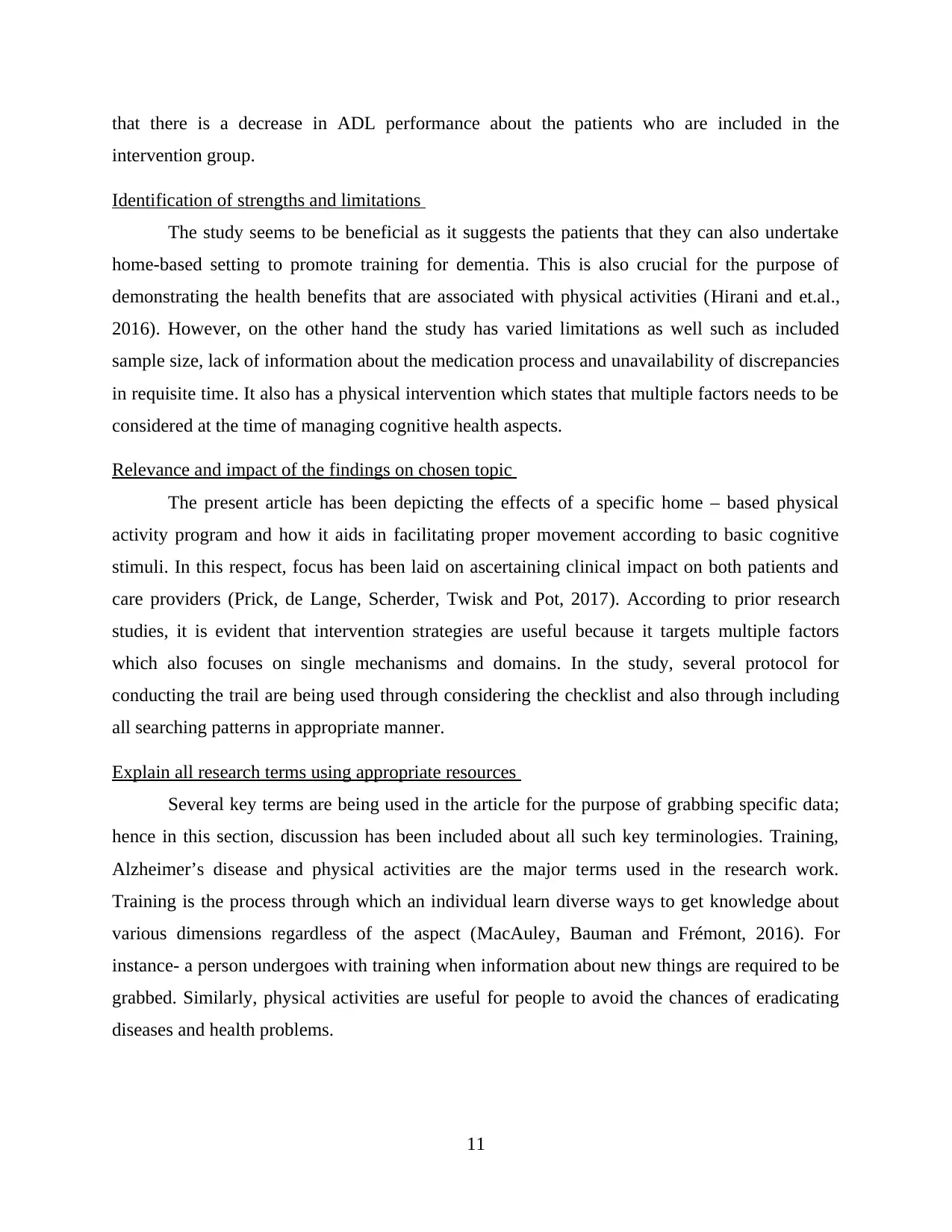
that there is a decrease in ADL performance about the patients who are included in the
intervention group.
Identification of strengths and limitations
The study seems to be beneficial as it suggests the patients that they can also undertake
home-based setting to promote training for dementia. This is also crucial for the purpose of
demonstrating the health benefits that are associated with physical activities (Hirani and et.al.,
2016). However, on the other hand the study has varied limitations as well such as included
sample size, lack of information about the medication process and unavailability of discrepancies
in requisite time. It also has a physical intervention which states that multiple factors needs to be
considered at the time of managing cognitive health aspects.
Relevance and impact of the findings on chosen topic
The present article has been depicting the effects of a specific home – based physical
activity program and how it aids in facilitating proper movement according to basic cognitive
stimuli. In this respect, focus has been laid on ascertaining clinical impact on both patients and
care providers (Prick, de Lange, Scherder, Twisk and Pot, 2017). According to prior research
studies, it is evident that intervention strategies are useful because it targets multiple factors
which also focuses on single mechanisms and domains. In the study, several protocol for
conducting the trail are being used through considering the checklist and also through including
all searching patterns in appropriate manner.
Explain all research terms using appropriate resources
Several key terms are being used in the article for the purpose of grabbing specific data;
hence in this section, discussion has been included about all such key terminologies. Training,
Alzheimer’s disease and physical activities are the major terms used in the research work.
Training is the process through which an individual learn diverse ways to get knowledge about
various dimensions regardless of the aspect (MacAuley, Bauman and Frémont, 2016). For
instance- a person undergoes with training when information about new things are required to be
grabbed. Similarly, physical activities are useful for people to avoid the chances of eradicating
diseases and health problems.
11
intervention group.
Identification of strengths and limitations
The study seems to be beneficial as it suggests the patients that they can also undertake
home-based setting to promote training for dementia. This is also crucial for the purpose of
demonstrating the health benefits that are associated with physical activities (Hirani and et.al.,
2016). However, on the other hand the study has varied limitations as well such as included
sample size, lack of information about the medication process and unavailability of discrepancies
in requisite time. It also has a physical intervention which states that multiple factors needs to be
considered at the time of managing cognitive health aspects.
Relevance and impact of the findings on chosen topic
The present article has been depicting the effects of a specific home – based physical
activity program and how it aids in facilitating proper movement according to basic cognitive
stimuli. In this respect, focus has been laid on ascertaining clinical impact on both patients and
care providers (Prick, de Lange, Scherder, Twisk and Pot, 2017). According to prior research
studies, it is evident that intervention strategies are useful because it targets multiple factors
which also focuses on single mechanisms and domains. In the study, several protocol for
conducting the trail are being used through considering the checklist and also through including
all searching patterns in appropriate manner.
Explain all research terms using appropriate resources
Several key terms are being used in the article for the purpose of grabbing specific data;
hence in this section, discussion has been included about all such key terminologies. Training,
Alzheimer’s disease and physical activities are the major terms used in the research work.
Training is the process through which an individual learn diverse ways to get knowledge about
various dimensions regardless of the aspect (MacAuley, Bauman and Frémont, 2016). For
instance- a person undergoes with training when information about new things are required to be
grabbed. Similarly, physical activities are useful for people to avoid the chances of eradicating
diseases and health problems.
11
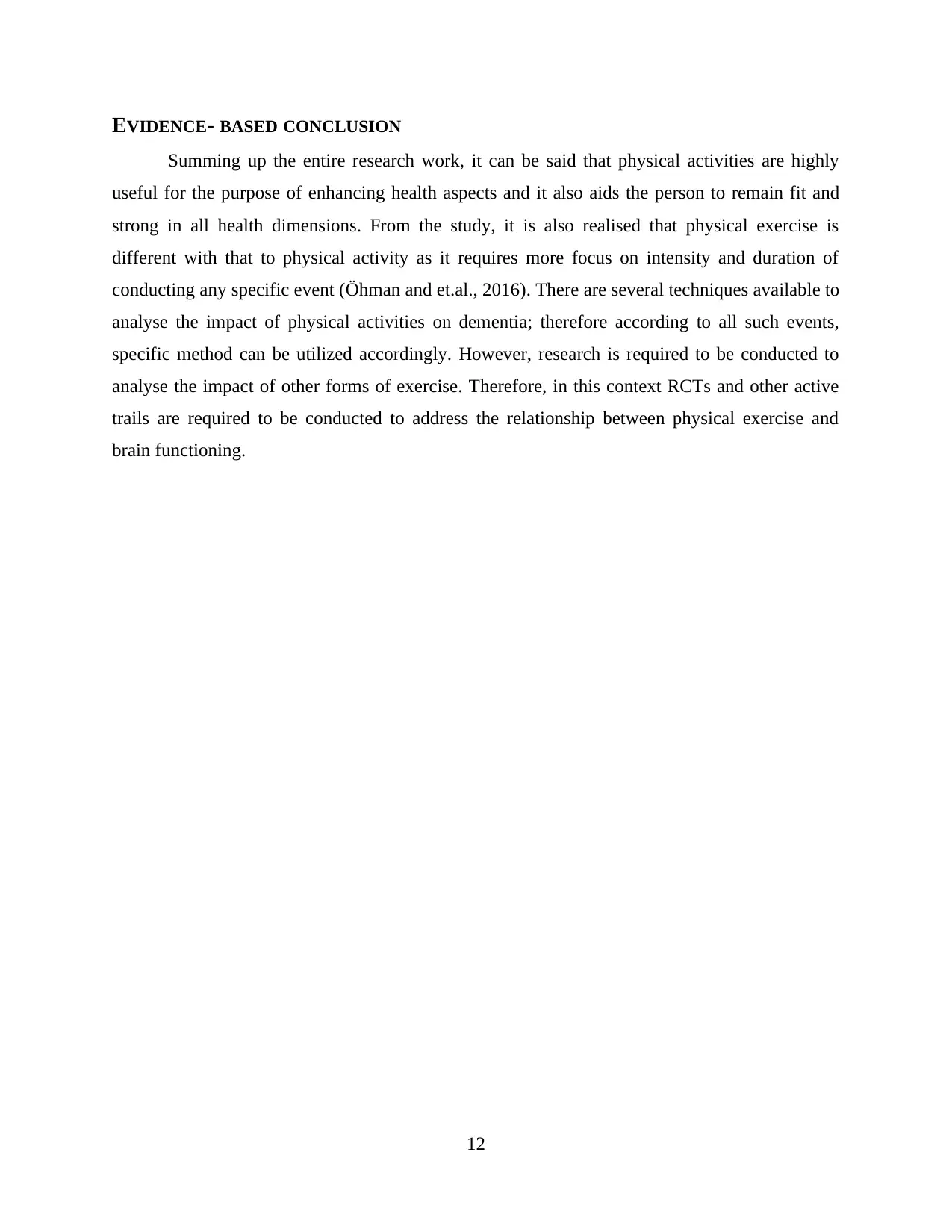
EVIDENCE- BASED CONCLUSION
Summing up the entire research work, it can be said that physical activities are highly
useful for the purpose of enhancing health aspects and it also aids the person to remain fit and
strong in all health dimensions. From the study, it is also realised that physical exercise is
different with that to physical activity as it requires more focus on intensity and duration of
conducting any specific event (Öhman and et.al., 2016). There are several techniques available to
analyse the impact of physical activities on dementia; therefore according to all such events,
specific method can be utilized accordingly. However, research is required to be conducted to
analyse the impact of other forms of exercise. Therefore, in this context RCTs and other active
trails are required to be conducted to address the relationship between physical exercise and
brain functioning.
12
Summing up the entire research work, it can be said that physical activities are highly
useful for the purpose of enhancing health aspects and it also aids the person to remain fit and
strong in all health dimensions. From the study, it is also realised that physical exercise is
different with that to physical activity as it requires more focus on intensity and duration of
conducting any specific event (Öhman and et.al., 2016). There are several techniques available to
analyse the impact of physical activities on dementia; therefore according to all such events,
specific method can be utilized accordingly. However, research is required to be conducted to
analyse the impact of other forms of exercise. Therefore, in this context RCTs and other active
trails are required to be conducted to address the relationship between physical exercise and
brain functioning.
12
⊘ This is a preview!⊘
Do you want full access?
Subscribe today to unlock all pages.

Trusted by 1+ million students worldwide
1 out of 14
Related Documents
Your All-in-One AI-Powered Toolkit for Academic Success.
+13062052269
info@desklib.com
Available 24*7 on WhatsApp / Email
![[object Object]](/_next/static/media/star-bottom.7253800d.svg)
Unlock your academic potential
Copyright © 2020–2026 A2Z Services. All Rights Reserved. Developed and managed by ZUCOL.





